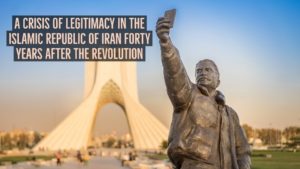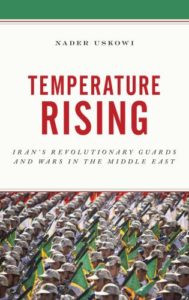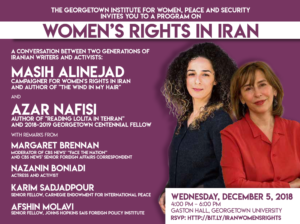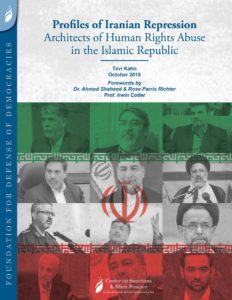 In historical examples of successful transitions to democracy, there has always been an alliance of democracy and civil society activists with centrists. The two must band together to prevent the military from tightening its grip on the country to a stranglehold, as has been the case in Pakistan and Egypt, argues Akbar Ganji.
In historical examples of successful transitions to democracy, there has always been an alliance of democracy and civil society activists with centrists. The two must band together to prevent the military from tightening its grip on the country to a stranglehold, as has been the case in Pakistan and Egypt, argues Akbar Ganji.
The power struggle between Iran’s hardliners and centrists within the ruling establishment presents an opportunity for civil society and democratic forces to strengthen labor unions and various other grass-roots organizations, he writes for Radio Farda.
Judging by their rhetoric, the hardline Revolutionary Guards Corps (IRGC) are pursuing the following agenda:
- First, with the help of the state broadcaster, dozens of websites, and Friday prayer leaders, they divide society into “true Jihadi revolutionaries” and Westernized Iranians who are not to be trusted.
- Second, they are bent on keeping Iran from normal relations with the West by labeling the nuclear agreement as “treason” and not allowing Iran to accept laws against money-laundering and terror-financing demanded by the Financial Action Task Force (FATF)…. The FATF requirements are not just Western demands. If Iran refrains from accepting these conditions, no one will do business with the country’s financial system; neither China nor South Africa—not even the Russians.
 Third, they try to portray the Rouhani government as the culprit for the country’s economic problems, while they are the ones who are responsible for creating non-transparent monopolies, and along with Khamenei, have pursued a foreign policy that has led to Iran’s economic isolation.
Third, they try to portray the Rouhani government as the culprit for the country’s economic problems, while they are the ones who are responsible for creating non-transparent monopolies, and along with Khamenei, have pursued a foreign policy that has led to Iran’s economic isolation.- Fourth, IRGC affiliates and their hardliner allies constantly call for Rouhani’s resignation.
While the infighting can be exploited by pro-democracy civil society, one mustn’t forget that centrists such as Rouhani and foreign minister Javad Zarif prevent war and they should be defended on those grounds, Ganji contends.
Other observers are wary of such purported moderates.
To his admirers, Javad Zarif is a skillful diplomat and fierce nationalist in constant danger of hardline domestic adversaries, notes Karim Sadjadpour, a Senior fellow at the Carnegie Endowment for International Peace. To his detractors, he is a pathologically dishonest, powerless apparatchik used by Tehran’s theocratic elite to manipulate credulous Americans and Europeans, he writes for the Atlantic:
 To Khamenei, Zarif’s enormous utility derives from the fact that he is both of these things, a sympathetic figure who can soften the edges of Iranian policy without actually changing it. Just as Leonid Brezhnev had Andrei Gromyko, Saddam Hussein had Tariq Aziz, and Muammar Qaddafi had Moussa Koussa, Iran’s autocrats understand that sending a moderate emissary out in the world protects their own power, rather than undermining it.
To Khamenei, Zarif’s enormous utility derives from the fact that he is both of these things, a sympathetic figure who can soften the edges of Iranian policy without actually changing it. Just as Leonid Brezhnev had Andrei Gromyko, Saddam Hussein had Tariq Aziz, and Muammar Qaddafi had Moussa Koussa, Iran’s autocrats understand that sending a moderate emissary out in the world protects their own power, rather than undermining it.
The Democracy Council invites you to:
Civil Society in Iran: Prospects for Reform & Implications for Policymakers
Friday, March 15, 2019 | 8:30 am-1:00 pm
2172 Rayburn House Office Building
45 Independence Ave SW | Washington, DC 20515
 A continental breakfast will be served from 8:00 am to 8:30 am. Panels include 1) Access to Independent Information & Media; 2) Marginalized Communities: Social & Political Movements; and 3) Civil Society: Trends & Prospects for Reform, followed by a keynote address on implications for policymakers.
A continental breakfast will be served from 8:00 am to 8:30 am. Panels include 1) Access to Independent Information & Media; 2) Marginalized Communities: Social & Political Movements; and 3) Civil Society: Trends & Prospects for Reform, followed by a keynote address on implications for policymakers.
Updated list of speakers:
- Masih Alinejad, VOA Persian Service
- Hamed Behravan, The Democracy Council
- Tara Sepehri Far, Human Rights Watch
- Saeid Golkar, University of Tennessee at Chattanooga
- Marjan Greenblatt, The Democracy Council/Alliance for Rights of Minorities
- Nader Hashemi, Denver University
- Brian Hook, Special Representative for Iran and Senior Policy Advisor to the Secretary of State (invited)
- Michael Hull, Psiphon
- Elise Labott, Foreign Affairs Journalist
- Shahin Milani, Iran Human Rights Documentation Center
- Farzin Nadimi, The Washington Institute for Near Policy
- Eric Novotny, The American University
- Azadeh Pourzand, Siamak Pourzand Foundation
- James Prince, The Democracy Council
- Rieneke van Santen, Zamaneh Media
- Mehdi Yahyanejad, Balatarin
*Additional speakers to be announced. This invitation is transferable. For more information, please contact: events@demcouncil.org For press inquiries, please contact Tamara Edwards: tamara@tamaraedwards.co Founded in 2000, the Democracy Council is a nonprofit, nonpartisan organization dedicated to promoting human rights, equal opportunity, good governance, rule of law, and combating extremism around the globe.







